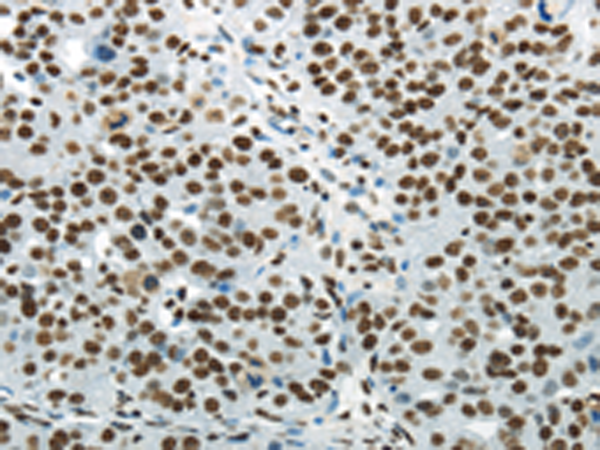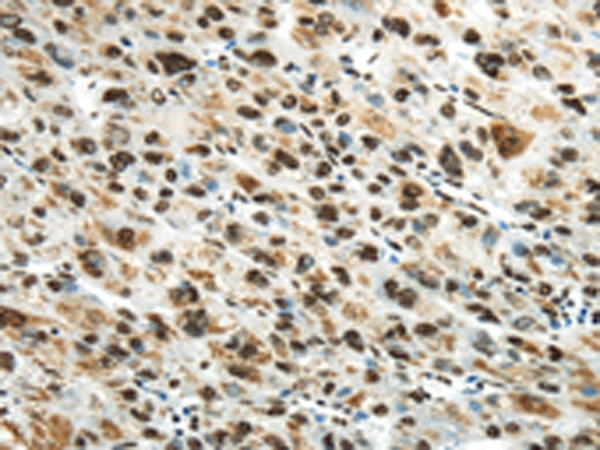


| WB | 咨询技术 | Human,Mouse,Rat |
| IF | 咨询技术 | Human,Mouse,Rat |
| IHC | 1/25-1/100 | Human,Mouse,Rat |
| ICC | 技术咨询 | Human,Mouse,Rat |
| FCM | 咨询技术 | Human,Mouse,Rat |
| Elisa | 1/2000-1/5000 | Human,Mouse,Rat |
| Aliases | CEAR; HNRPM; HTGR1; NAGR1; HNRPM4; HNRNPM4; hnRNP M |
| WB Predicted band size | 78 kDa |
| Host/Isotype | Rabbit IgG |
| Antibody Type | Primary antibody |
| Storage | Store at 4°C short term. Aliquot and store at -20°C long term. Avoid freeze/thaw cycles. |
| Species Reactivity | Human, Mouse, Rat |
| Immunogen | Synthetic peptide of human HNRNPM |
| Formulation | Purified antibody in PBS with 0.05% sodium azide and 50% glycerol. |
+ +
以下是3篇与HNRNPM抗体相关的代表性文献摘要:
1. **《hnRNP M regulates CD44 alternative splicing》**
*作者:Xu Y, et al. (2014) Genes Dev.*
摘要:研究通过hnRNP M特异性抗体进行RIP-seq分析,揭示该蛋白通过结合CD44 pre-mRNA的重复序列元件,调控其可变剪接过程,影响肿瘤细胞迁移能力。
2. **《HNRNPM guides metastasis-promoting alternative splicing events in pancreatic cancer》**
*作者:Chen Y, et al. (2020) Nat Commun.*
摘要:使用HNRNPM抗体进行免疫共沉淀联合质谱分析,证明其通过调控TGFBR2等基因的可变剪接,促进胰腺癌转移,抗体特异性验证采用siRNA敲低后Western blot对照。
3. **《HnRNP M interacts with PSF and represses adenosine deaminase RNA editing》**
*作者:Banerjee A, et al. (2017) Nucleic Acids Res.*
摘要:通过HNRNPM抗体进行Co-IP实验,发现其与剪接因子PSF相互作用,抑制ADAR介导的RNA编辑过程,研究中使用多种商业抗体进行定位及功能验证。
注:实际引用建议通过PubMed等数据库核对最新文献,部分早期研究可能涉及抗体特异性验证不充分的情况。
The heterogeneous nuclear ribonucleoprotein M (HNRNPM) is a member of the hnRNP family, which plays critical roles in RNA metabolism, including pre-mRNA splicing, mRNA stability, translation, and nuclear export. HNRNPM specifically binds to RNA through its RNA recognition motifs (RRMs) and is involved in regulating alternative splicing of genes linked to cancer, neurodevelopment, and stress responses. Antibodies targeting HNRNPM are essential tools for studying its expression, localization, and molecular interactions in both physiological and pathological contexts.
HNRNPM antibodies are widely used in techniques like Western blotting, immunoprecipitation, and immunofluorescence to investigate its role in diseases such as cancer (e.g., breast cancer, glioblastoma) and neurodegenerative disorders. Research has shown that HNRNPM overexpression or dysfunction correlates with tumor progression, metastasis, and aberrant splicing events. These antibodies also help elucidate HNRNPM's interaction with viral RNAs or proteins during infections.
Validating HNRNPM antibody specificity is crucial, often confirmed via siRNA knockdown or knockout controls. Commercial antibodies vary in host species, clonality, and epitope specificity, requiring careful selection based on experimental needs. Ongoing studies continue to uncover HNRNPM's regulatory networks, emphasizing the importance of reliable antibodies in advancing RNA biology and therapeutic targeting.
×